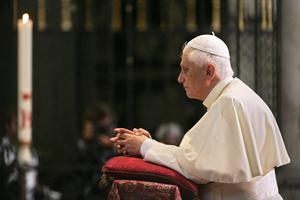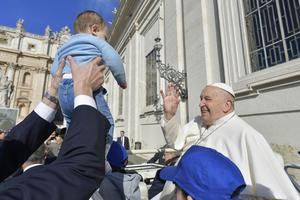Pope Benedict XVI Loved the Church Enough to Make a Difficult and Painful Decision
COMMENTARY: A deeper examination of Benedict’s reasons to resign can help us to see why it was courageous, not cowardly.

Pope Benedict XVI was the greatest theologian to occupy the Chair of Peter since at least Pope St. Leo the Great (440-461). The Catholic Church in future centuries may find Pope Benedict’s papal and pre-papal contributions even greater than the one whose writings on the Incarnation are still pondered every Christmas and whose Tome brought the Christological controversies of the fourth and fifth centuries to a close.
Unless, however, papal abdications become routine, future centuries may regard him less in the category of papal doctors of the Church like Leo and Gregory the Great and more in that of Celestine V and Gregory XII, who both resigned the papacy.
The former category is certainly one of great honor. The latter is normally treated as one of shame. Our culture normally equates resigning — unless done in principled protest against evil — with quitting or failing, both of which are generally accompanied by shame.
In Pope Benedict’s case, following St. John Paul II’s intrepid completion of his papacy, inspired, John Paul said, because Christ did not come down from the cross; Pope Benedict’s renunciation, in contrast, seems unfaithful and cowardly.
Due to the nature of the spiritual paternity associated with the papacy, to resign also seems akin to a father’s unholy abandonment of his familial vocation and commitment.
Moreover, some Catholics concerned by various developments in the pontificate of Pope Francis have expressed resentment toward — or even place the blame on — Pope Benedict because, they argue, if Benedict hadn’t resigned, and presumably had served what turned out to be almost another decade of life, those developments would never have materialized.
So Pope Benedict’s resignation has become a real obstacle to the assessment of his legacy, including among those who were convinced of his sanctity and historic importance prior to the events of early 2013.
But a deeper examination of Pope Benedict’s reasons given for his resignation can help us to see why it was courageous, not cowardly, faithful not fickle, and a confirmation rather than a contradiction of the character so many had rightly grown to esteem.
When Pope Benedict shocked the cardinals in the Sala (Hall) of the Consistory on Feb. 11, 2013, by declaring in Latin that 17 days later he would vacate the See of Peter, he underlined, “After having repeatedly examined my conscience before God, I have come to the certainty that my strengths, due to an advanced age, are no longer suited to an adequate exercise of the Petrine ministry.”
Pope Benedict had long called conscience an “inner organ of sensitivity” to the voice of God, indicating to us what to do or avoid. While the judgments of conscience can be erroneous, he had been tuning his “organ” and fighting against false ideas of conscience for so long that it was highly unlikely that he has hearing the Lord say, “Go” when the Lord was in fact stressing, “Continue on.”
His decision to resign, therefore, was not the “No” of someone who just wanted to quit the burdens of the papacy, but one more “Yes” in a lifetime of faithful fiats to what the Lord had asked of him.
It had become clear to him by this point that he lacked what he knew the papacy required.
In his last general audience, on Feb. 27, the day before he left in a helicopter for Castel Gandolfo, he said, “In these last months I have felt my energies declining, and I have asked God insistently in prayer to grant me his light and to help me make the right decision, not for my own good, but for the good of the Church. I have taken this step with full awareness of its gravity and even its novelty, but with profound interior serenity.”
In his 2016 book-length interview with Peter Seewald, he said that he talked about it “extensively with the loving God” because the papacy’s “responsibility and seriousness called for the most thorough examination, time and again having to examine yourself before God and before yourself.”
“You have to lay out all your affairs before [God] as clearly as possible and try not to see everything only in terms of efficiency or other criteria for resignation, but to look at it from faith. It was precisely from this perspective that I became convinced that the commission of Peter demanded concrete decisions, insights, from me. … I was not able to give very much any longer. … The Pope is no Superman, and his mere existence is not sufficient to conduct his role.”
He told Seewald that his doctor had informed him after his 2012 trip to Mexico and Cuba that he was not strong enough to fly over the Atlantic again, as he was scheduled to do for World Youth Day in Rio in 2013. He also said that the “Pope must do concrete things,” like “receiving heads of state, receiving bishops with whom one must be able to enter into a deeply intimate conversation, [and make] the decisions that come each day. Even if you say a few of these things can be struck off, there remain so many things that are essential, that, if the capability to do them is no longer there … now’s the time to free up the chair.”
While he still had the mind and the wisdom to serve, he no longer had the strength, stamina and energy. If most pastors would be physically challenged to administer a busy parish in their mid-80s, it’s far more demanding to preside over a Church of more than 1 billion people and fulfill a pope’s schedule of lengthy liturgies, continuous high-level meetings and speeches, as well as grueling international travel.
And by the time of his resignation, Pope Benedict had had two strokes, a pacemaker for 20 years, prostate problems, degenerative joint disease and was losing sight in one eye.
So this “simple and humble worker in the Lord’s vineyard,” as he introduced himself at the beginning of his papacy, meekly and courageously made the decision to become the first pope in 598 years to step down.
He said during his last general audience, “Loving the Church means also having the courage to make difficult, painful decisions, always looking to the good of the Church and not of oneself. … I am not abandoning the cross, but remaining in a new way at the side of the Crucified Lord. I no longer bear the power of office for the governance of the Church, but in the service of prayer I remain, so to speak, in the enclosure of St. Peter. … I will continue to accompany the Church’s journey with prayer and reflection, with that devotion to the Lord and his Bride which I have hitherto sought to practice daily and which I would like to practice always.”
Though his decision was difficult and painful for him and for the Church, he had the love to make it and to shift his responsibilities to prayer, which he always taught was the most important thing that disciples can do. By resigning the papacy to continue to serve the Church through prayer, he reiterated that the work of prayer is even more important than the ministry of the papacy.
Praying would be the way he would continue his work as a holy father.
“Even a father’s role stops,” he told Seewald. “A father does not stop being a father, but he is relieved of concrete responsibility. He remains a father in a deep, inward sense, in a particular relationship that has responsibility, but not with day-to-day tasks.”
When Seewald asked if he regretted his decision at all, Benedict said, “No!” three times and added, “Every day I see that it was right. … It was considered long enough and spoken about with the Lord.”
Pope Benedict was convinced to the end that he had made the right decision in conscience. Those who admire the enormous God-given gifts of faith, wisdom, courage and love for the truth he displayed over the course of his first 85 years ought to trust in how he exercised them in the biggest decision of his papacy and life.
And we pray that the crucial work in love of the Church he began at 8:01pm on Feb. 28, 2013, continues in the Father’s house.
- Keywords:
- benedict xvi
- papal resignation
- father roger landry

















